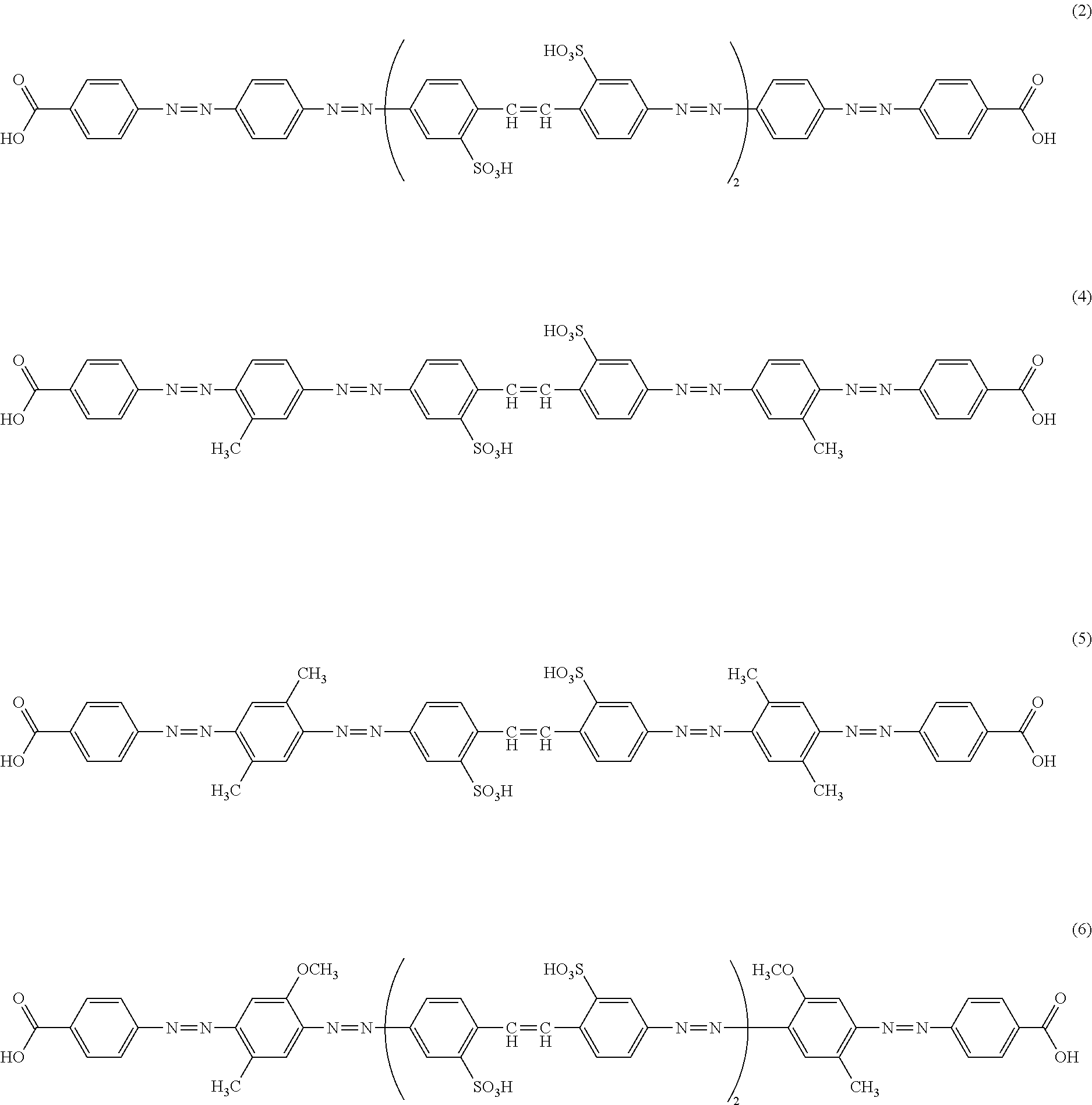Azo Compound And Salt Thereof, And Dye-Containing Polarizing Film Comprising The Compound Or Salt
a technology of azo compound and compound, which is applied in the direction of polarising elements, polyazo dyes, instruments, etc., to achieve excellent polarization performance and resistance to humidity, heat and light, and high performan
- Summary
- Abstract
- Description
- Claims
- Application Information
AI Technical Summary
Benefits of technology
Problems solved by technology
Method used
Image
Examples
example 1
[0061]13.7 parts of 4-aminobenzoic acid was added to 500 parts of water and dissolved with sodium hydroxide. After cooling, 32 parts of 35% aqueous hydrochloric acid and subsequently 6.9 parts of sodium nitrite were added at a temperature of 10° C. or below, and the reaction mixture was stirred at 5 to 10° C. for 1 hour. To this was added 20.9 parts of sodium aniline-ω-methanesulfonate and, while the reaction mixture was stirred at 20 to 30° C., sodium carbonate was added to adjust the pH to 3.5. By further stirring, the coupling reaction was completed and a monoazo compound was obtained by filtration. The monoazo compound obtained was stirred at 90° C. in the presence of sodium hydroxide to obtain 17 parts of a monoazo compound represented by the following formula (7).
[0062]After 12 parts of the monoazo compound represented by the formula (7) and 21 parts of 4,4′-dinitrostilbene-2,2′-sulfonic acid were dissolved in 300 parts of water, 12 parts of sodium hydroxide was added and the ...
example 2
[0063]After 12 parts of the monoazo compound represented by the formula (7) and 10 parts of 4,4′-dinitrostilbene-2,2′-sulfonic acid were dissolved in 300 parts of water, 24 parts of sodium hydroxide was added and the reaction mixture was subjected to condensation reaction at 90° C. Then, the reaction mixture was reduced by 18 parts of glucose, salted out with sodium chloride, and filtered to obtain 20 parts of the azo compound represented by the formula (3). This compound was orange in color and its solution in 20% aqueous pyridine showed an absorption maximum at a wavelength of 428 nm.
example 3
[0064]To 500 parts of water was added 13.7 parts of 4-aminobenzoic acid and was dissolved with sodium hydroxide. After cooling, 32 parts of 35% aqueous hydrochloric acid and, subsequently, 6.9 parts of sodium nitrite were added at a temperature of 10° C. or below and the reaction mixture was stirred at 5 to 10° C. for 1 hour. To this was added 13.7 parts of 2-methoxy-5-methylaniline and, while the reaction mixture was stirred at 20 to 30° C., sodium carbonate was added to adjust the pH to 3.5. By further stirring, the coupling reaction was completed and the reaction mixture was filtered to obtain a monoazo compound. The monoazo compound obtained was stirred at 90° C. in the presence of sodium hydroxide to obtain 26 parts of monoazo compound represented by the following formula (8).
[0065]In 300 parts of water, 14 parts of the monoazo compound represented by the formula (8) and 21 parts of 4,4′-dinitrostilbene-2,2′-sulfonic acid were dissolved and, after addition of 12 parts of sodium...
PUM
| Property | Measurement | Unit |
|---|---|---|
| pH | aaaaa | aaaaa |
| temperature | aaaaa | aaaaa |
| temperature | aaaaa | aaaaa |
Abstract
Description
Claims
Application Information
 Login to View More
Login to View More - R&D
- Intellectual Property
- Life Sciences
- Materials
- Tech Scout
- Unparalleled Data Quality
- Higher Quality Content
- 60% Fewer Hallucinations
Browse by: Latest US Patents, China's latest patents, Technical Efficacy Thesaurus, Application Domain, Technology Topic, Popular Technical Reports.
© 2025 PatSnap. All rights reserved.Legal|Privacy policy|Modern Slavery Act Transparency Statement|Sitemap|About US| Contact US: help@patsnap.com



